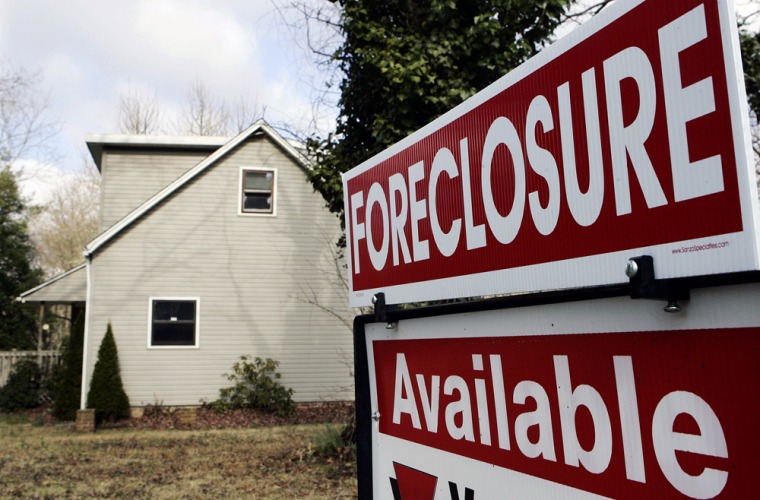A recent cartoon in The New Yorker magazine depicts a small cottage with frightened-looking little pigs staring out of three windows. At the front door stands a wolf in slacks, a tie and suspenders, intoning, "I'm not huffing and puffing. I'm foreclosing."
The cartoon titillates with a strange combination of poignancy and humor. The key to its poignancy is one of timing: Even a year ago we wouldn't have been so bathed in news of housing's woes — including foreclosures — to have related to the about-to-be-ousted pigs. But now, there clearly is so much awry in the world of housing and homebuilding that I'm betting it'll take far longer for a recovery than even most confirmed bears — or wolves — expect.
Let's look quickly at four issues that must be resolved before housing can stop being a drain on our economy:
The pigs aren't the only ones
RealtyTrac, an online marketplace for foreclosed properties, recently reported that default notices, auction sale notices and bank repossessions jumped 57 percent from its year-earlier pace. If you're numbed to percentages, that's 234,685 affected properties. One out of every 139 households in Nevada received a foreclosure notice, making the state the leading place in the nation for such actions. California and Florida continued in second and third place, respectively.
There are, of course, a couple of difficulties with foreclosures. First, they're disruptive to families, neighborhoods and communities. But beyond that, every foreclosed property adds to the bulging inventory of homes available for sale, slowing the ability of homebuilders like Pulte, Ryland, and Lennar to resume the use of black ink. Most observers believe that, with the pace of mortgage rate resets still picking up, we may not have seen anything yet regarding the number of foreclosures actions.
The mortgage lending system is broken
It's still possible to obtain a normal 30-year fixed-rate mortgage. (My wife and I did so a month ago.) But the days of lenders casually tossing mortgages to buyers who shouldn't have qualified to finance a pencil are long gone. Although what's left of Countrywide continues to muddle along, and the likes of JPMorgan Chase and Wells Fargo are still making loans, there are far fewer pure mortgage lenders than was the case just a year ago.
In addition, the rest of the mortgage lending apparatus, from appraisals to securitizations, is a shadow of its former self. All this will make it tough for lending to contribute meaningfully to a housing recovery.
Consumer confidence is in the toilet
For April 2008, the Reuters/University of Michigan Surveys of Consumers said its index, which measures how enthusiastic you and I and our neighbors are about the economy, hit a 26-year low of 62.6. That compares to an average of 85.6 for 2007.
I'll guarantee that, with crude oil prices more than $130 a barrel, gasoline going for an average of $3.87 a gallon nationwide and dire predictions proliferating of $200 oil within a year or two, every time a consumer — and that's all of us — pulls up to the pump, the collective confidence level takes another hit. Folks who lack confidence in the economy or in their own financial situations don't often buy homes.
There's a bigger underlying inventory of homes for sale than you realize
We're all aware of the number of homes available for sale from the homebuilders, and the Realtors' association keeps us up to date on the pace and price of existing homes turnover, but those numbers don't tell the whole story. How many of your friends or neighbors would list their homes in a New York minute if they thought there were any realistic prospect of a sale? I'm willing to wager that the underlying contingent of houses not yet technically on the market may dwarf the inventory we know about.
Conclusions
Beyond these impediments to a housing recovery, it's easy to catalog a host of other aspects of the general economy that are feeling puny. For instance, there are the secondary effects of skyrocketing energy prices — the average airfare climbed 10.2 percent in March — the squashed dollar (which helps exports but hammers us in the inflationary pocketbook) and the broader curtailment of credit.
All this tells me that if you think you've found a bottom for housing that'll keep the builders' share prices from sliding lower, you just might be right. But the bigger consideration may be that the shares you buy may take far longer to rise from those bottoms than you're expecting.
